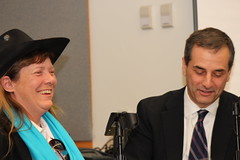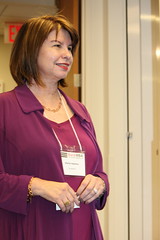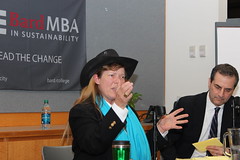 There was a wonderful turnout on the evening of Monday March 5th as we met once again for the Sustainable Business Series, this time for “A Conversation with Hunter Lovins.” The evening started with a warm introduction of the sustainable business legend by Marlys Appleton of the Women’s Network for Sustainable Futures (WNSF), one of the evening’s co-sponsors. Appleton recognized Hunter for her leadership in supporting, mentoring, and reaching out to the future leaders in the environmental movement, something that is very much in line with WNSF’s goal of advancing the sustainability of businesses through the leadership of women like Hunter.
There was a wonderful turnout on the evening of Monday March 5th as we met once again for the Sustainable Business Series, this time for “A Conversation with Hunter Lovins.” The evening started with a warm introduction of the sustainable business legend by Marlys Appleton of the Women’s Network for Sustainable Futures (WNSF), one of the evening’s co-sponsors. Appleton recognized Hunter for her leadership in supporting, mentoring, and reaching out to the future leaders in the environmental movement, something that is very much in line with WNSF’s goal of advancing the sustainability of businesses through the leadership of women like Hunter.
 Bard MBA & CEP Director Eban Goodstein began the evening’s conversation with the statement that those in attendance understand our sustainability challenge, and recognized that we were there to celebrate an inspirational idea, promoted largely by Hunter throughout her career, that there is no necessary conflict between profit and solving the earth’s problems. He explained that the distinction between policy and business was that the arena of policy looks at how to change the rules of the game through regulations at different levels of government, or within a corporation or organization. The business arena is for people who want to play the game, with the rules as given.
Bard MBA & CEP Director Eban Goodstein began the evening’s conversation with the statement that those in attendance understand our sustainability challenge, and recognized that we were there to celebrate an inspirational idea, promoted largely by Hunter throughout her career, that there is no necessary conflict between profit and solving the earth’s problems. He explained that the distinction between policy and business was that the arena of policy looks at how to change the rules of the game through regulations at different levels of government, or within a corporation or organization. The business arena is for people who want to play the game, with the rules as given.
Hunter has been one of these leaders throughout the years and can be credited, at least in part, with taking something that was a novel idea and making it commonsense, leading Director Goodstein to ask how the idea of “natural capitalism” came into being. Hunter explained that this idea came about because “we failed.” Elaborating on this statement, she said that policy is necessary but inefficient, and business is the engine of society. We are in a capitalist realm, but nobody counts human or natural capital on their balance sheets, missing out on the core business benefits they provide, and making us bad capitalists. This error inspired the writing of the book “Natural Capitalism.” But in her experience, it’s easy for organizations and leadership to say these words, it’s much more difficult to stay true to what the words mean through action.

To follow up on this point, Director Goodstein wanted to know what the strategies were for making a profit and changing the world, specifically wondering about the 4 principles mentioned in the book. Hunter explained the story of how the book (co-authored by Amory Lovins and Paul Hawken) was finished, and it wasn’t until an article for the Harvard Business Review that they developed the 4 principles: efficiency, biomimicry, solution economy, and restoration. But in hindsight, Hunter now thinks these principles need to be re-defined into verbs instead of nouns, and shrunken to 3 principles:
- Buy time using resources more efficiently
- Re-design how we make and deliver everything
- Manage all institutions to be restorative of human and natural capital
But the question remained, how to make money by investing in natural capital, to which Hunter had a ready response: by not destroying it. How to make money in the restorative process is a lot harder sell, it’s a lot more work and more costly to re-build nature. She did say that bringing back biodiversity and water tables was a necessary solution and commented that this was one of the cutting edge areas of business and technological development that is currently emerging.
 Director Goodstein then wanted to know if there were any emerging principles of sustainability that could be added to the conversation. This “interesting question” left Hunter pondering for a moment, but she did offer that a new frontier is the melding together of human development with that of environmental protection. This is something that Rio+20 is trying to re-badge, framing the debate as the future that we want instead of what we don’t want. This requires us to answer the question of what it would look and feel like if we won, and how we would implement this in an urban setting. With three quarters of the population expected to live in cities between 2030 and 2040, building all this infrastructure becomes a driver of change and we need to identify the new business opportunities.
Director Goodstein then wanted to know if there were any emerging principles of sustainability that could be added to the conversation. This “interesting question” left Hunter pondering for a moment, but she did offer that a new frontier is the melding together of human development with that of environmental protection. This is something that Rio+20 is trying to re-badge, framing the debate as the future that we want instead of what we don’t want. This requires us to answer the question of what it would look and feel like if we won, and how we would implement this in an urban setting. With three quarters of the population expected to live in cities between 2030 and 2040, building all this infrastructure becomes a driver of change and we need to identify the new business opportunities.

In her closing thoughts on the night, Hunter said that we need to learn how to do business in a new world where everything is changing. She cited the analogy of a caterpillar climbing into its chrysalis: when it enters it has no idea what is about to happen to it, and when it emerges it is a beautiful butterfly. But in the middle, if you were to break the cocoon open, all you find in the middle is mush. Right now, we are in the mush phase and we need strong leadership to help guide us out.
It was an inspirational night of dialogue with Hunter, and we are excited to have her teaching in the new MBA program. Next week will conclude the Sustainable Business Series, once again at Cook + Fox, with a discussion of “Energy Finance,” so we hope to see you there! Also, stay tuned for a follow-up post with Hunter’s answers to all the audience questions.
–Melissa Provinsal CEP‘12